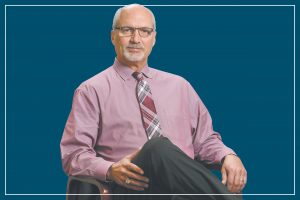Subscriber Benefit
As a subscriber you can listen to articles at work, in the car, or while you work out. Subscribe Now
St. Joseph County Prosecutor
University of Notre Dame Law School, 1990
Why did you decide to enter the legal profession?
I wanted to fight for those who didn’t have a voice. I used to teach (before law school) and at some point realized that I could have a more profound impact by using a law degree than anything else.
If you hadn’t pursued a legal career, what would you be doing?
Teaching.
Who is someone who has inspired you in your career?
My father, Dale Cotter, who taught me to strive to do what is right. The first prosecutor who hired me, Mike Barnes, who taught me to make decisions based upon facts, not on any preconceived beliefs. I learned that regardless of all of the outside noise and whether we think we should charge someone, we must first determine whether the facts support that charge. And my sister, Colleen Cotter, executive director at the Legal Aid Society of Cleveland, who continues to challenge me to look beyond first impressions. That people are more than a label and we are closer to each other than we may want to admit.
What’s the best advice you’ve ever received?
The Serenity Prayer comes to mind: “God, grant me the serenity to accept the things I cannot change, the courage to change the things I can, and the wisdom to know the difference.”
What is something you wish people knew about lawyers?
That the law profession runs the same spectrum as any other profession. There are good ones, some not so good, and those who run in the middle. It’s not the profession; it’s the person that makes the difference.
Tell us about a “lesson learned” moment you’ve had in your career.
In my career as a prosecutor, I’d always been taught that merely because a person has committed a crime doesn’t make them a bad person. It’s the act (crime) that we have to hold accountable. This adage became much more real a few years ago when I ran into a person I had previously helped put in prison for a pretty horrific crime. After he got out of prison, he began working with “at-risk” teens in our community and has been able to reach them in ways few could. I now call him my friend. The “lesson learned moment”? That while we should hold the “act” accountable, the “act” doesn’t always define the person.
Tell us something surprising about you.
I’ve been a prosecutor most of my legal life. Growing up, I always thought I would be a defense attorney.
What makes a good lawyer/judge?
The ability to critically think.
Please enable JavaScript to view this content.
